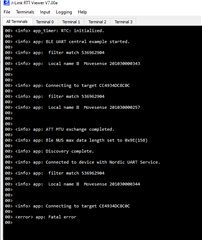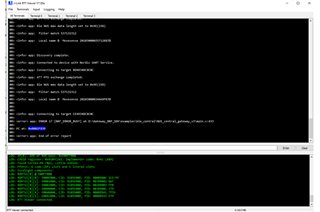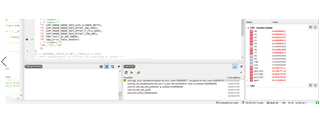Hi,
We are trying to create a network using 20 movesense sensors and BWG840 Fanstel gateway acting as the central. The gateway is running a modified ble app uart multilink code from GitHub for connecting to the sensors. While developing and testing using the setup, we came across few odd behaviors. It would be great if someone can help us in figuring out the same.
- If the peripherals are advertising before the gateway starts running, the gateway code crashes with a fatal error. The code hits the NRF_BREAKPOINT_COND and halts. Is this expected? Is there any workaround for this behavior?
- If the peripherals are being turned on one by one, the code works perfectly. We can connect to these sensors and control them as per our use case. Is there any mandatory requirement like sensors have to be turned on in a sequential manner?
- Do we need to make some modifications in the connection interval and timing as we increase the sensor count?
- When we increase the sensor count to 19 in sdk_config.h using the macros mentioned below
// <o> NRF_SDH_BLE_PERIPHERAL_LINK_COUNT - Maximum number of peripheral links.
#ifndef NRF_SDH_BLE_PERIPHERAL_LINK_COUNT
#define NRF_SDH_BLE_PERIPHERAL_LINK_COUNT 0
#endif// <o> NRF_SDH_BLE_CENTRAL_LINK_COUNT - Maximum number of central links.
#ifndef NRF_SDH_BLE_CENTRAL_LINK_COUNT
#define NRF_SDH_BLE_CENTRAL_LINK_COUNT 19
#endif// <o> NRF_SDH_BLE_TOTAL_LINK_COUNT - Total link count.
// <i> Maximum number of total concurrent connections using the default configuration.#ifndef NRF_SDH_BLE_TOTAL_LINK_COUNT
Code fails with error message nrf_sdh_ble: sd_ble_enable() returned nrf_error_no_mem. But the RAM start address was modified in the linker script to the value shown in the log message. But still, this message comes? Is 18 sensors the maximum possible?
#define NRF_SDH_BLE_TOTAL_LINK_COUNT 19
We have attached the code and images we have captured using the setup

/**
* Copyright (c) 2016 - 2019, Nordic Semiconductor ASA
*
* All rights reserved.
*
* Redistribution and use in source and binary forms, with or without modification,
* are permitted provided that the following conditions are met:
*
* 1. Redistributions of source code must retain the above copyright notice, this
* list of conditions and the following disclaimer.
*
* 2. Redistributions in binary form, except as embedded into a Nordic
* Semiconductor ASA integrated circuit in a product or a software update for
* such product, must reproduce the above copyright notice, this list of
* conditions and the following disclaimer in the documentation and/or other
* materials provided with the distribution.
*
* 3. Neither the name of Nordic Semiconductor ASA nor the names of its
* contributors may be used to endorse or promote products derived from this
* software without specific prior written permission.
*
* 4. This software, with or without modification, must only be used with a
* Nordic Semiconductor ASA integrated circuit.
*
* 5. Any software provided in binary form under this license must not be reverse
* engineered, decompiled, modified and/or disassembled.
*
* THIS SOFTWARE IS PROVIDED BY NORDIC SEMICONDUCTOR ASA "AS IS" AND ANY EXPRESS
* OR IMPLIED WARRANTIES, INCLUDING, BUT NOT LIMITED TO, THE IMPLIED WARRANTIES
* OF MERCHANTABILITY, NONINFRINGEMENT, AND FITNESS FOR A PARTICULAR PURPOSE ARE
* DISCLAIMED. IN NO EVENT SHALL NORDIC SEMICONDUCTOR ASA OR CONTRIBUTORS BE
* LIABLE FOR ANY DIRECT, INDIRECT, INCIDENTAL, SPECIAL, EXEMPLARY, OR
* CONSEQUENTIAL DAMAGES (INCLUDING, BUT NOT LIMITED TO, PROCUREMENT OF SUBSTITUTE
* GOODS OR SERVICES; LOSS OF USE, DATA, OR PROFITS; OR BUSINESS INTERRUPTION)
* HOWEVER CAUSED AND ON ANY THEORY OF LIABILITY, WHETHER IN CONTRACT, STRICT
* LIABILITY, OR TORT (INCLUDING NEGLIGENCE OR OTHERWISE) ARISING IN ANY WAY OUT
* OF THE USE OF THIS SOFTWARE, EVEN IF ADVISED OF THE POSSIBILITY OF SUCH DAMAGE.
*
*/
#include <stdio.h>
#include <stdint.h>
#include <stdbool.h>
#include "nordic_common.h"
#include "app_error.h"
#include "app_uart.h"
#include "ble_db_discovery.h"
#include "app_timer.h"
#include "app_util.h"
#include "bsp_btn_ble.h"
#include "ble.h"
#include "ble_gap.h"
#include "ble_hci.h"
#include "nrf_sdh.h"
#include "nrf_sdh_ble.h"
#include "nrf_sdh_soc.h"
#include "ble_nus_c.h"
#include "ble_conn_state.h"
#include "nrf_ble_gatt.h"
#include "nrf_pwr_mgmt.h"
#include "nrf_ble_scan.h"
#include "nrf_log.h"
#include "nrf_log_ctrl.h"
#include "nrf_log_default_backends.h"
#include "nrf_delay.h"
#include "ble_advdata.h"
#define APP_BLE_CONN_CFG_TAG 1 /**< Tag that refers to the BLE stack configuration set with @ref sd_ble_cfg_set. The default tag is @ref BLE_CONN_CFG_TAG_DEFAULT. */
#define APP_BLE_OBSERVER_PRIO 3 /**< BLE observer priority of the application. There is no need to modify this value. */
#define UART_TX_BUF_SIZE 256 /**< UART TX buffer size. */
#define UART_RX_BUF_SIZE 256 /**< UART RX buffer size. */
#define NUS_SERVICE_UUID_TYPE BLE_UUID_TYPE_VENDOR_BEGIN /**< UUID type for the Nordic UART Service (vendor specific). */
#define ECHOBACK_BLE_UART_DATA 1 /**< Echo the UART data that is received over the Nordic UART Service (NUS) back to the sender. */
BLE_NUS_C_ARRAY_DEF(m_ble_nus_c, NRF_SDH_BLE_CENTRAL_LINK_COUNT); /**< BLE Nordic UART Service (NUS) client instances. */
NRF_BLE_GATT_DEF(m_gatt); /**< GATT module instance. */
BLE_DB_DISCOVERY_DEF(m_db_disc); /**< Database discovery module instance. */
NRF_BLE_SCAN_DEF(m_scan); /**< Scanning Module instance. */
NRF_BLE_GQ_DEF(m_ble_gatt_queue, /**< BLE GATT Queue instance. */
NRF_SDH_BLE_CENTRAL_LINK_COUNT,
NRF_BLE_GQ_QUEUE_SIZE);
static uint16_t m_ble_nus_max_data_len = BLE_GATT_ATT_MTU_DEFAULT - OPCODE_LENGTH - HANDLE_LENGTH; /**< Maximum length of data (in bytes) that can be transmitted to the peer by the Nordic UART service module. */
///**@brief NUS UUID. */
//static ble_uuid_t const m_nus_uuid =
//{
// .uuid = BLE_UUID_NUS_SERVICE,
// .type = NUS_SERVICE_UUID_TYPE
//};
static char const m_target_periph_name[] = "Movesense";
/**@brief Function for handling asserts in the SoftDevice.
*
* @details This function is called in case of an assert in the SoftDevice.
*
* @warning This handler is only an example and is not meant for the final product. You need to analyze
* how your product is supposed to react in case of assert.
* @warning On assert from the SoftDevice, the system can only recover on reset.
*
* @param[in] line_num Line number of the failing assert call.
* @param[in] p_file_name File name of the failing assert call.
*/
void assert_nrf_callback(uint16_t line_num, const uint8_t * p_file_name)
{
app_error_handler(0xDEADBEEF, line_num, p_file_name);
}
/**@brief Function for handling the Nordic UART Service Client errors.
*
* @param[in] nrf_error Error code containing information about what went wrong.
*/
static void nus_error_handler(uint32_t nrf_error)
{
APP_ERROR_HANDLER(nrf_error);
}
/**@brief Function to start scanning. */
static void scan_start(void)
{
ret_code_t ret;
ret = nrf_ble_scan_start(&m_scan);
APP_ERROR_CHECK(ret);
ret = bsp_indication_set(BSP_INDICATE_SCANNING);
APP_ERROR_CHECK(ret);
}
/**@brief Function for handling Scanning Module events.
*/
static void scan_evt_handler(scan_evt_t const * p_scan_evt)
{
ret_code_t err_code;
bool local_name_flag;
switch(p_scan_evt->scan_evt_id)
{
case NRF_BLE_SCAN_EVT_FILTER_MATCH:
{
ble_gap_evt_adv_report_t const * p_adv_report;
//adv. report from a device that passed the filter criteria
p_adv_report = p_scan_evt->params.filter_match.p_adv_report;
NRF_LOG_INFO(" filter match %d",p_adv_report);
//TODO: parse adv report data with "Advertising data encoder" module. Ref. https://infocenter.nordicsemi.com/topic/sdk_nrf5_v17.0.2/group__ble__sdk__lib__advdata.html
local_name_flag = ble_advdata_name_find(p_scan_evt->params.filter_match.p_adv_report->data.p_data,p_scan_evt->params.filter_match.p_adv_report->data.len, m_target_periph_name);
if(local_name_flag)
NRF_LOG_INFO(" Local name %s \r\n",p_scan_evt->params.filter_match.p_adv_report->data.p_data);
local_name_flag = false;
}
break;
case NRF_BLE_SCAN_EVT_CONNECTING_ERROR:
{
err_code = p_scan_evt->params.connecting_err.err_code;
APP_ERROR_CHECK(err_code);
} break;
case NRF_BLE_SCAN_EVT_CONNECTED:
{
ble_gap_evt_connected_t const * p_connected =
p_scan_evt->params.connected.p_connected;
NRF_LOG_INFO("Connecting to target %02x%02x%02x%02x%02x%02x",
p_connected->peer_addr.addr[0],
p_connected->peer_addr.addr[1],
p_connected->peer_addr.addr[2],
p_connected->peer_addr.addr[3],
p_connected->peer_addr.addr[4],
p_connected->peer_addr.addr[5]
);
} break;
case NRF_BLE_SCAN_EVT_SCAN_TIMEOUT:
{
NRF_LOG_INFO("Scan timed out.");
scan_start();
} break;
default:
break;
}
}
/**@brief Function for initializing the scanning and setting the filters.
*/
static void scan_init(void)
{
ret_code_t err_code;
nrf_ble_scan_init_t init_scan;
memset(&init_scan, 0, sizeof(init_scan));
init_scan.connect_if_match = true;
init_scan.conn_cfg_tag = APP_BLE_CONN_CFG_TAG;
err_code = nrf_ble_scan_init(&m_scan, &init_scan, scan_evt_handler);
APP_ERROR_CHECK(err_code);
err_code = nrf_ble_scan_filter_set(&m_scan, SCAN_NAME_FILTER, m_target_periph_name);
APP_ERROR_CHECK(err_code);
err_code = nrf_ble_scan_filters_enable(&m_scan, NRF_BLE_SCAN_NAME_FILTER, false);
APP_ERROR_CHECK(err_code);
}
/**@brief Function for handling database discovery events.
*
* @details This function is a callback function to handle events from the database discovery module.
* Depending on the UUIDs that are discovered, this function forwards the events
* to their respective services.
*
* @param[in] p_event Pointer to the database discovery event.
*/
static void db_disc_handler(ble_db_discovery_evt_t * p_evt)
{
ble_nus_c_on_db_disc_evt(&m_ble_nus_c[p_evt->conn_handle], p_evt);
}
/**@brief Function for handling characters received by the Nordic UART Service (NUS).
*
* @details This function takes a list of characters of length data_len and prints the characters out on UART.
* If @ref ECHOBACK_BLE_UART_DATA is set, the data is sent back to sender.
*/
static void ble_nus_chars_received_uart_print(uint8_t * p_data, uint16_t data_len)
{
ret_code_t ret_val;
NRF_LOG_DEBUG("Receiving data.");
NRF_LOG_HEXDUMP_DEBUG(p_data, data_len);
for (uint32_t i = 0; i < data_len; i++)
{
do
{
ret_val = app_uart_put(p_data[i]);
if ((ret_val != NRF_SUCCESS) && (ret_val != NRF_ERROR_BUSY))
{
NRF_LOG_ERROR("app_uart_put failed for index 0x%04x.", i);
APP_ERROR_CHECK(ret_val);
}
} while (ret_val == NRF_ERROR_BUSY);
}
if (p_data[data_len-1] == '\r')
{
while (app_uart_put('\n') == NRF_ERROR_BUSY);
}
// if (ECHOBACK_BLE_UART_DATA)
// {
// for(int c = 0; c < NRF_SDH_BLE_CENTRAL_LINK_COUNT; c++)
// {
// // Send data back to the peripheral.
// do
// {
// ret_val = ble_nus_c_string_send(&m_ble_nus_c[c], p_data, data_len);
// if ((ret_val != NRF_SUCCESS) && (ret_val != NRF_ERROR_BUSY) && (ret_val != NRF_ERROR_INVALID_STATE))
// {
// NRF_LOG_ERROR("Failed sending NUS message. Error 0x%x. ", ret_val);
// APP_ERROR_CHECK(ret_val);
// }
// } while (ret_val == NRF_ERROR_BUSY);
// }
// }
}
/**@brief Function for handling app_uart events.
*
* @details This function receives a single character from the app_uart module and appends it to
* a string. The string is sent over BLE when the last character received is a
* 'new line' '\n' (hex 0x0A) or if the string reaches the maximum data length.
*/
void uart_event_handle(app_uart_evt_t * p_event)
{
static uint8_t data_array[BLE_NUS_MAX_DATA_LEN];
static uint16_t index = 0;
uint32_t ret_val;
switch (p_event->evt_type)
{
/**@snippet [Handling data from UART] */
case APP_UART_DATA_READY:
UNUSED_VARIABLE(app_uart_get(&data_array[index]));
index++;
if ((data_array[index - 1] == '\n') ||
(data_array[index - 1] == '\r') ||
(index >= (m_ble_nus_max_data_len)))
{
NRF_LOG_DEBUG("Ready to send data over BLE NUS");
NRF_LOG_HEXDUMP_DEBUG(data_array, index);
for(int c = 0; c < NRF_SDH_BLE_CENTRAL_LINK_COUNT; c++)
{
do
{
ret_val = ble_nus_c_string_send(&m_ble_nus_c[c], data_array, index);
if ( (ret_val != NRF_ERROR_INVALID_STATE) && (ret_val != NRF_ERROR_RESOURCES) )
{
APP_ERROR_CHECK(ret_val);
}
} while (ret_val == NRF_ERROR_RESOURCES);
}
index = 0;
}
break;
/**@snippet [Handling data from UART] */
case APP_UART_COMMUNICATION_ERROR:
NRF_LOG_ERROR("Communication error occurred while handling UART.");
APP_ERROR_HANDLER(p_event->data.error_communication);
break;
case APP_UART_FIFO_ERROR:
NRF_LOG_ERROR("Error occurred in FIFO module used by UART.");
APP_ERROR_HANDLER(p_event->data.error_code);
break;
default:
break;
}
}
/**@brief Callback handling Nordic UART Service (NUS) client events.
*
* @details This function is called to notify the application of NUS client events.
*
* @param[in] p_ble_nus_c NUS client handle. This identifies the NUS client.
* @param[in] p_ble_nus_evt Pointer to the NUS client event.
*/
/**@snippet [Handling events from the ble_nus_c module] */
static void ble_nus_c_evt_handler(ble_nus_c_t * p_ble_nus_c, ble_nus_c_evt_t const * p_ble_nus_evt)
{
ret_code_t err_code;
switch (p_ble_nus_evt->evt_type)
{
case BLE_NUS_C_EVT_DISCOVERY_COMPLETE:
NRF_LOG_INFO("Discovery complete.");
err_code = ble_nus_c_handles_assign(p_ble_nus_c, p_ble_nus_evt->conn_handle, &p_ble_nus_evt->handles);
APP_ERROR_CHECK(err_code);
err_code = ble_nus_c_tx_notif_enable(p_ble_nus_c);
APP_ERROR_CHECK(err_code);
NRF_LOG_INFO("Connected to device with Nordic UART Service.");
break;
case BLE_NUS_C_EVT_NUS_TX_EVT:
ble_nus_chars_received_uart_print(p_ble_nus_evt->p_data, p_ble_nus_evt->data_len);
break;
case BLE_NUS_C_EVT_DISCONNECTED:
NRF_LOG_INFO("Disconnected.");
scan_start();
break;
}
}
/**@snippet [Handling events from the ble_nus_c module] */
/**
* @brief Function for handling shutdown events.
*
* @param[in] event Shutdown type.
*/
static bool shutdown_handler(nrf_pwr_mgmt_evt_t event)
{
ret_code_t err_code;
err_code = bsp_indication_set(BSP_INDICATE_IDLE);
APP_ERROR_CHECK(err_code);
switch (event)
{
case NRF_PWR_MGMT_EVT_PREPARE_WAKEUP:
// Prepare wakeup buttons.
err_code = bsp_btn_ble_sleep_mode_prepare();
APP_ERROR_CHECK(err_code);
break;
default:
break;
}
return true;
}
NRF_PWR_MGMT_HANDLER_REGISTER(shutdown_handler, APP_SHUTDOWN_HANDLER_PRIORITY);
/**@brief Function for handling BLE events.
*
* @param[in] p_ble_evt Bluetooth stack event.
* @param[in] p_context Unused.
*/
static void ble_evt_handler(ble_evt_t const * p_ble_evt, void * p_context)
{
ret_code_t err_code;
ble_gap_evt_t const * p_gap_evt = &p_ble_evt->evt.gap_evt;
switch (p_ble_evt->header.evt_id)
{
case BLE_GAP_EVT_CONNECTED:
err_code = ble_nus_c_handles_assign(&m_ble_nus_c[p_ble_evt->evt.gap_evt.conn_handle], p_ble_evt->evt.gap_evt.conn_handle, NULL);
APP_ERROR_CHECK(err_code);
err_code = bsp_indication_set(BSP_INDICATE_CONNECTED);
APP_ERROR_CHECK(err_code);
// start discovery of services. The NUS Client waits for a discovery result
err_code = ble_db_discovery_start(&m_db_disc, p_ble_evt->evt.gap_evt.conn_handle);
APP_ERROR_CHECK(err_code);
if (ble_conn_state_central_conn_count() < NRF_SDH_BLE_CENTRAL_LINK_COUNT)
{
// Resume scanning.
scan_start();
}
break;
case BLE_GAP_EVT_DISCONNECTED:
NRF_LOG_INFO("Disconnected. conn_handle: 0x%x, reason: 0x%x",
p_gap_evt->conn_handle,
p_gap_evt->params.disconnected.reason);
break;
case BLE_GAP_EVT_TIMEOUT:
if (p_gap_evt->params.timeout.src == BLE_GAP_TIMEOUT_SRC_CONN)
{
NRF_LOG_INFO("Connection Request timed out.");
}
break;
case BLE_GAP_EVT_SEC_PARAMS_REQUEST:
// Pairing not supported.
err_code = sd_ble_gap_sec_params_reply(p_ble_evt->evt.gap_evt.conn_handle, BLE_GAP_SEC_STATUS_PAIRING_NOT_SUPP, NULL, NULL);
APP_ERROR_CHECK(err_code);
break;
case BLE_GAP_EVT_CONN_PARAM_UPDATE_REQUEST:
// Accepting parameters requested by peer.
err_code = sd_ble_gap_conn_param_update(p_gap_evt->conn_handle,
&p_gap_evt->params.conn_param_update_request.conn_params);
APP_ERROR_CHECK(err_code);
break;
case BLE_GAP_EVT_PHY_UPDATE_REQUEST:
{
NRF_LOG_DEBUG("PHY update request.");
ble_gap_phys_t const phys =
{
.rx_phys = BLE_GAP_PHY_AUTO,
.tx_phys = BLE_GAP_PHY_AUTO,
};
err_code = sd_ble_gap_phy_update(p_ble_evt->evt.gap_evt.conn_handle, &phys);
APP_ERROR_CHECK(err_code);
} break;
case BLE_GATTC_EVT_TIMEOUT:
// Disconnect on GATT Client timeout event.
NRF_LOG_DEBUG("GATT Client Timeout.");
err_code = sd_ble_gap_disconnect(p_ble_evt->evt.gattc_evt.conn_handle,
BLE_HCI_REMOTE_USER_TERMINATED_CONNECTION);
APP_ERROR_CHECK(err_code);
break;
case BLE_GATTS_EVT_TIMEOUT:
// Disconnect on GATT Server timeout event.
NRF_LOG_DEBUG("GATT Server Timeout.");
err_code = sd_ble_gap_disconnect(p_ble_evt->evt.gatts_evt.conn_handle,
BLE_HCI_REMOTE_USER_TERMINATED_CONNECTION);
APP_ERROR_CHECK(err_code);
break;
default:
break;
}
}
/**@brief Function for initializing the BLE stack.
*
* @details Initializes the SoftDevice and the BLE event interrupt.
*/
static void ble_stack_init(void)
{
ret_code_t err_code;
err_code = nrf_sdh_enable_request();
APP_ERROR_CHECK(err_code);
// Configure the BLE stack using the default settings.
// Fetch the start address of the application RAM.
uint32_t ram_start = 0;
err_code = nrf_sdh_ble_default_cfg_set(APP_BLE_CONN_CFG_TAG, &ram_start);
APP_ERROR_CHECK(err_code);
// Enable BLE stack.
err_code = nrf_sdh_ble_enable(&ram_start);
APP_ERROR_CHECK(err_code);
// Register a handler for BLE events.
NRF_SDH_BLE_OBSERVER(m_ble_observer, APP_BLE_OBSERVER_PRIO, ble_evt_handler, NULL);
}
/**@brief Function for handling events from the GATT library. */
void gatt_evt_handler(nrf_ble_gatt_t * p_gatt, nrf_ble_gatt_evt_t const * p_evt)
{
if (p_evt->evt_id == NRF_BLE_GATT_EVT_ATT_MTU_UPDATED)
{
NRF_LOG_INFO("ATT MTU exchange completed.");
m_ble_nus_max_data_len = p_evt->params.att_mtu_effective - OPCODE_LENGTH - HANDLE_LENGTH;
NRF_LOG_INFO("Ble NUS max data length set to 0x%X(%d)", m_ble_nus_max_data_len, m_ble_nus_max_data_len);
}
}
/**@brief Function for initializing the GATT library. */
void gatt_init(void)
{
ret_code_t err_code;
err_code = nrf_ble_gatt_init(&m_gatt, gatt_evt_handler);
APP_ERROR_CHECK(err_code);
err_code = nrf_ble_gatt_att_mtu_central_set(&m_gatt, NRF_SDH_BLE_GATT_MAX_MTU_SIZE);
APP_ERROR_CHECK(err_code);
}
/**@brief Function for handling events from the BSP module.
*
* @param[in] event Event generated by button press.
*/
void bsp_event_handler(bsp_event_t event)
{
ret_code_t err_code;
switch (event)
{
case BSP_EVENT_SLEEP:
nrf_pwr_mgmt_shutdown(NRF_PWR_MGMT_SHUTDOWN_GOTO_SYSOFF);
break;
case BSP_EVENT_DISCONNECT:
for(int c = 0; c < NRF_SDH_BLE_CENTRAL_LINK_COUNT; c++)
{
err_code = sd_ble_gap_disconnect(m_ble_nus_c[c].conn_handle,
BLE_HCI_REMOTE_USER_TERMINATED_CONNECTION);
if (err_code != NRF_ERROR_INVALID_STATE)
{
APP_ERROR_CHECK(err_code);
}
}
break;
default:
break;
}
}
/**@brief Function for initializing the UART. */
static void uart_init(void)
{
ret_code_t err_code;
app_uart_comm_params_t const comm_params =
{
.rx_pin_no = NRF_GPIO_PIN_MAP(1, 1),
.tx_pin_no = NRF_GPIO_PIN_MAP(1, 2),
.rts_pin_no = RTS_PIN_NUMBER,
.cts_pin_no = CTS_PIN_NUMBER,
.flow_control = APP_UART_FLOW_CONTROL_DISABLED,
.use_parity = false,
.baud_rate = UART_BAUDRATE_BAUDRATE_Baud115200
};
APP_UART_FIFO_INIT(&comm_params,
UART_RX_BUF_SIZE,
UART_TX_BUF_SIZE,
uart_event_handle,
APP_IRQ_PRIORITY_LOWEST,
err_code);
APP_ERROR_CHECK(err_code);
}
/**@brief Function for initializing the Nordic UART Service (NUS) client. */
static void nus_c_init(void)
{
ret_code_t err_code;
ble_nus_c_init_t init;
init.evt_handler = ble_nus_c_evt_handler;
init.error_handler = nus_error_handler;
init.p_gatt_queue = &m_ble_gatt_queue;
for(int c = 0; c < NRF_SDH_BLE_CENTRAL_LINK_COUNT; c++)
{
err_code = ble_nus_c_init(&m_ble_nus_c[c], &init);
APP_ERROR_CHECK(err_code);
}
}
/**@brief Function for initializing buttons and leds. */
static void buttons_leds_init(void)
{
ret_code_t err_code;
bsp_event_t startup_event;
err_code = bsp_btn_ble_init(NULL, &startup_event);
APP_ERROR_CHECK(err_code);
nrf_gpio_cfg_output(NRF_GPIO_PIN_MAP(1, 0));
nrf_gpio_cfg_output(11);
nrf_gpio_pin_clear(NRF_GPIO_PIN_MAP(1, 0));
nrf_gpio_pin_clear(11);
nrf_delay_ms(300);
nrf_gpio_pin_set(NRF_GPIO_PIN_MAP(1, 0));
nrf_gpio_pin_set(11);
nrf_delay_ms(300);
nrf_gpio_pin_clear(NRF_GPIO_PIN_MAP(1, 0));
nrf_gpio_pin_clear(11);
nrf_delay_ms(300);
nrf_gpio_pin_set(NRF_GPIO_PIN_MAP(1, 0));
nrf_gpio_pin_set(11);
}
/**@brief Function for initializing the timer. */
static void timer_init(void)
{
ret_code_t err_code = app_timer_init();
APP_ERROR_CHECK(err_code);
}
/**@brief Function for initializing the nrf log module. */
static void log_init(void)
{
ret_code_t err_code = NRF_LOG_INIT(NULL);
APP_ERROR_CHECK(err_code);
NRF_LOG_DEFAULT_BACKENDS_INIT();
}
/**@brief Function for initializing power management.
*/
static void power_management_init(void)
{
ret_code_t err_code;
err_code = nrf_pwr_mgmt_init();
APP_ERROR_CHECK(err_code);
}
/** @brief Function for initializing the database discovery module. */
static void db_discovery_init(void)
{
ble_db_discovery_init_t db_init;
memset(&db_init, 0, sizeof(ble_db_discovery_init_t));
db_init.evt_handler = db_disc_handler;
db_init.p_gatt_queue = &m_ble_gatt_queue;
ret_code_t err_code = ble_db_discovery_init(&db_init);
APP_ERROR_CHECK(err_code);
}
/**@brief Function for handling the idle state (main loop).
*
* @details Handles any pending log operations, then sleeps until the next event occurs.
*/
static void idle_state_handle(void)
{
if (NRF_LOG_PROCESS() == false)
{
nrf_pwr_mgmt_run();
}
}
int main(void)
{
// Initialize.
log_init();
timer_init();
uart_init();
buttons_leds_init();
db_discovery_init();
power_management_init();
ble_stack_init();
gatt_init();
nus_c_init();
ble_conn_state_init();
scan_init();
// Start execution.
printf("BLE UART central example started.\r\n");
NRF_LOG_INFO("BLE UART central example started.");
scan_start();
// Enter main loop.
for (;;)
{
idle_state_handle();
}
}




